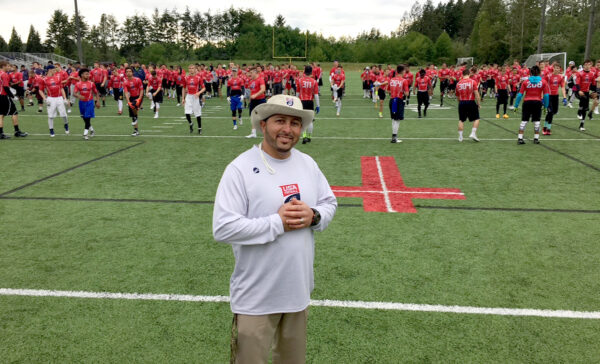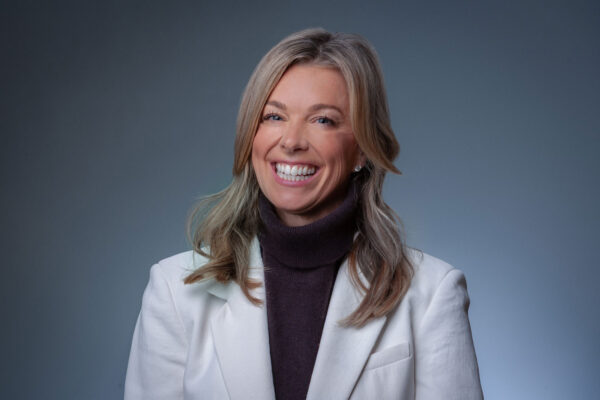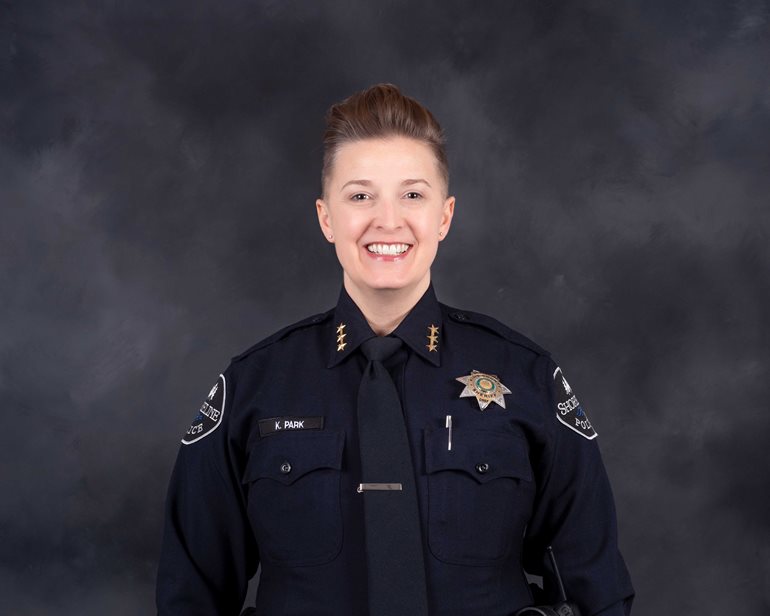
One day in the mid-1980s, a crisply uniformed DARE police officer visited an elementary school assembly in Edmond, Oklahoma — and very much impressed a shy girl named Kelly Park.
Fast-forward through the years to October 2022: That young Oklahoma girl is now an experienced and highly trained police officer herself and was recently sworn in as the new chief of police for the city of Shoreline, Washington.
There were many stops along the way, including classes at the University of Central Oklahoma, competitions in Taekwondo around the world, a run for the U.S. Olympic team and success in several other law enforcement positions. These experiences all helped to make Park the community leader she now is.
But Park, now 45, also credits her education at the University of Washington Bothell for preparing her for a life of public service. She graduated in 2000 with a Bachelor of Arts in Society, Ethics & Human Behavior, among the first cohort of students to graduate from the then-new UW Bothell campus.
An early martial arts education
Not many people know as children what careers they want as adults, but it became clear to Park when she was just 8 years old. “I felt the calling to serve,” Park said. “I knew that’s what I wanted to do.”
Watching that DARE program officer back in grade school helped seal the deal in her mind. “Just his presence, his calm demeanor, how he interacted with all of us — it made a huge impression on me,” she said. “I knew that was it. That was what I wanted to do.”
Clearly someone who knew her own mind early, Park also took up a serious study of Taekwondo, a Korean martial art, at the age of 9. And she learned personal skills far beyond the physical rigor of punching and spinning jump kicks, she said. “I think with any martial art there’s an element of respect,” Park said, “and teamwork as well, even though it’s an individual sport. Respect and discipline.”
Park won world championships in Taekwondo, traveled widely and placed third in the 2000 Olympic trials but didn’t quite make the team. It boosted her confidence, though, to make a commitment to excellence, to become truly accomplished — and to know it.
“It felt good to work super hard at something and have a positive outcome. And it was unusual,” she said. “Honestly, girls didn’t do that sport back in the day, and they were not easy on me. When you keep getting beat up, after a while you either quit or you figure out how not to get beat up. And I chose the latter.”
Still training for the Olympic Games even as she began looking for her next educational step, Park moved to Seattle in 1998 after taking her prerequisite college courses in Oklahoma. “I knew I wanted to study people, how we tick, how we operate,” she said.
That’s when she found UW Bothell. Beyond the curriculum itself, the University’s flexible schedules allowed her both to keep training and to keep her counseling job at the Echo Glen Children’s Center in Snoqualmie, Washington. “It just felt like the absolute perfect fit,” she said. “It allowed me to keep on with life, where I didn’t have an option otherwise.”
A higher ed program that fit
UW Bothell’s interdisciplinary degrees were of particular interest, and Park chose the Society, Ethics & Human Behavior program. The program uses multiple disciplines from psychology to media studies, cultural studies, ethics, political philosophy and more to help students explore how social institutions and practices shape human experience — and, in turn, how people contribute to social stability and social change.
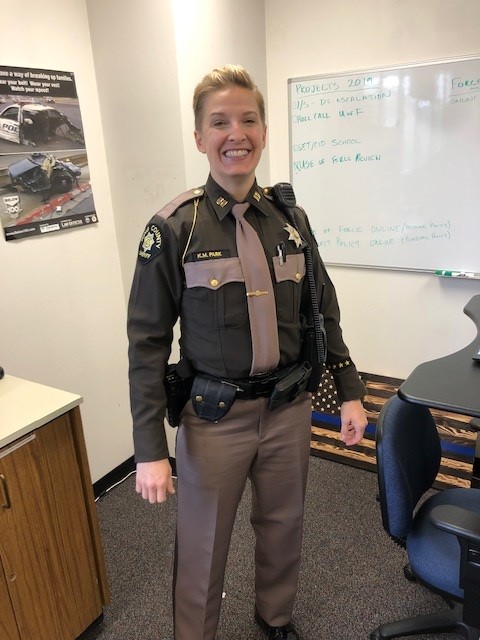
Dr. Christian Anderson, associate professor in the School of Interdisciplinary Arts & Sciences and faculty coordinator for the program, said the curriculum gives students the chance to learn different perspectives with exercises in shared leadership and collaboration so that they gain the confidence and adaptability to succeed in a variety of situations.
“Rather than presuming to know all the solutions to the issues facing society,” Anderson said, “the degree is meant to equip students with flexible ways of thinking about how social formations are always changing — are shaped, reproduced and changed in all kinds of different ways.”
Park said she appreciated that her classes were small and “extremely interactive” rather than impersonal and held in large auditoriums. She also liked that students could get to know each other as well as their professors.
“That’s what I enjoyed most about UW Bothell — and that’s the way I’m approaching police work here in Shoreline as well.”
Law enforcement requires the ability to be responsive and flexible depending on different circumstances or people’s needs, Park believes, noting that these are two critical skills she honed at UW Bothell.
“I don’t think anybody should be talking at people and making all the decisions … I think everything turns out better when you take a collaborative partnership approach.”
Ongoing promotions and commitment
The city of Shoreline contracts with King County for police work, said Park, which gives officers — all deputies with the county — the chance to move about and diversify their careers, which she certainly did.
Park began as a rookie officer in Shoreline and held positions in the cities of Woodinville and Burien, with Sound Transit and in the court protection unit at the King County courthouse as she rose steadily in rank. She worked as a detective sergeant and investigator for the internal investigative unit in Seattle, then returned later as commander of the unit.
And while Park works in a male-dominated field, she said male peers have always treated her with respect. “I’ve always just tried to earn my keep, if that makes sense,” she said. “I wanted to be the partner that when I showed up on a call with them they would think, ‘Thank goodness Kelly’s here!’”
Park returned to Shoreline as a captain and was sworn in as chief in October 2022, following the retirement of the city’s longtime chief, Shawn Ledford.
One of the key goals for her and the city, she said, is to strive to be an anti-racist community. That’s a huge endeavor and means rebuilding trust, being open-minded — and “having meaningful conversations and working in partnership with the people we serve.”
She added, “It is very honorable work. I’m very proud of this work, but it is certainly not easy.”
Park said she has no ambitions beyond her new job and intends to retire from police work as Shoreline’s chief, although she could see herself working in some sort of educational capacity following her law enforcement career.
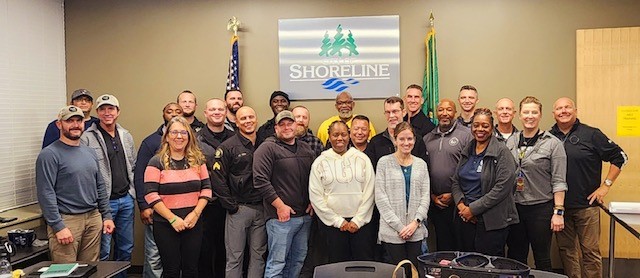
Perfect program for police work
For a shy Oklahoma girl, UW Bothell’s Society, Ethics & Human Behavior proved an excellent education for a career of dedicated public service.
Said Chief Park, “I cannot think of any other program that would have suited me better, to prepare me for this line of work.”
On a more personal note, Park is married with a daughter in high school and a son and stepdaughter in middle school. Her wife, Diana, is a first-grade, dual-language teacher in the Franklin-Pierce School District.
And Park is already encouraging her daughter to attend UW Bothell and will say the same to the other children when the time comes.
“I think it’s an excellent transition from high school to university. The classes are high-caliber and the professors are fantastic so you’re going to get a wonderful education,” she said. “It’s also just a nice place to be.”
